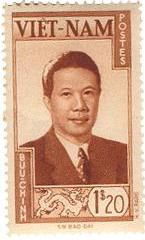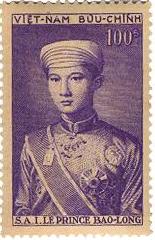Great Britain and the United States recognized Emperor Bao Dai's government but no one was willing to step in and press for Vietnamese independence except for the communists. China began pouring more and more support into Ho Chih Minh's government in North Vietnam while Emperor Bao Dai was left to being only a figure-head once again. It would be untrue to say that the Vietnamese, especially in the south, did not still respect their traditions and their Emperor, but as long as the French kept their grip on his government he did not matter whose name was at the top of government functions. Slowly the French were defeated by the Vietminh and the United States began taking over as the main opposition to communist dominance in southeast Asia.
At the time of the Geneva talks, Bao Dai named Ngo Dinh Diem Prime Minister of Vietnam. The Emperor stated that Diem was the only one capable of saving the country from the situation it found itself in, beset by Communists and abandoned by France. Ngo Dinh Diem was a prominant member of Vietnam's Catholic minority, which made him unpopular with many Buddhists and had been a lifelong monarchist, though he often opposed Bao Dai for his cooperation with the French and "playboy" lifestyle. It was not long before opposition to Diem grew due to his unification policies and no-compromise attitude. Bao Dai was almost helpless in this situation, so far removed from the country, and seeing how dangerous the situation was, stated he had no desire to return saying "I have no need to be killed". Eventually Diem and many around him began to see Bao Dai as an enemy and a hinderance to their efforts to firmly unite the south for the all out war that was coming against the Communists. With American backing, on October 23, 1955 Ngo Dinh Diem held a referendum to decide the form of government and the fate of Bao Dai. With his soldiers supervising the polling stations the result was an embarassingly high 99% in favor of abolishing the monarchy. The vote had been rigged and everyone knew it. What bothered the Americans the most was that rigging a vote against the distant, and by now much forgotten emperor, seemed totally unneccessary to most observers.
With no other option Emperor Bao Dai again abdicated his throne, stressing the need for peace and unification. Ngo Dinh Diem assumed power as the first President of South Vietnam, an act which made it certain that North Vietnam would never reconcile. The Diem government was known for it's absolute opposition to Communism and efforts to impose Catholic morality on Vietnamese society. Eventually the U.S. government backed a coup to remove the man they had helped place in office and Ngo Dinh Diem was killed by his own military. As for Emperor Bao Dai, he retired to an uneventful life of exile in France. On September 19, 1963 Empress Nam Phuong died and the Emperor later remarried in 1968 and had another daughter as well as converting to the Catholic Church. Aside from one statement urging peace and unity in his native country, Bao Dai became just another minor celebrity in France. When the exiled Imperial Family fell on hard times in 1972 the Empress Dowager had to sell off valuables from Hue to support them. The end came in 1997 at a military hospital in Paris where Emperor Bao Dai, the last Vietnamese "Son of Heaven" passed away at the age of 84. Upon his death, Crown Prince Bao Long became head of the Nguyen Dynasty which lives in France and the United States. |



